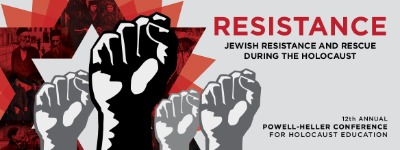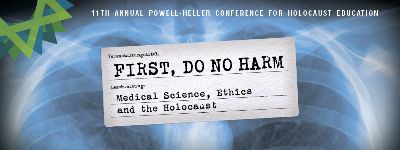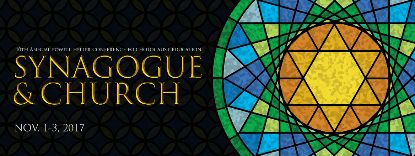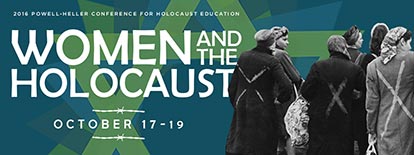Past Powell-Heller Holocaust Conferences

2019 Powell-Heller Conference for Holocaust Education
“Jews went like sheep to the slaughter,” is often heard in popular accounts of how the Holocaust unfolded. “Why didn’t Jews fight back, resist?” “If death was a certainty, why didn’t they rise up?” These are some of the most often repeated questions students ask educators when addressing the image of Jewish passivity in the face of Nazi persecution. These types of questions, while completely discredited by scholarly works, continues to live on in everyday conversations about the Nazi attempts to annihilate the Jews. This year, our conference will add more knowledge about the various ways Jews attempted to resist the Nazi plan of the mass murder of their community. What will emerge from the panels will be a variety of ways in which Jews did, in fact, offer resistance. In some cases, Jews joined partisan groups or participated in uprisings in ghettos and concentration camps, taking up arms to fight against their oppressors. In other instances, Jews practiced resistance by joining underground activities to preserve artifacts and accounts of the Jewish community under the Nazi regime. Still others, in their everyday lives, continued to resist the Nazis by maintaining their spiritual practices, by engaging in sports activities such as soccer, or by creating music to lift people’s spirits. Jews also worked in underground organizations to assist in aid and rescue work, risking their own lives in an attempt to keep others alive as well.
The methods of resistance and rescue work varied according to circumstances. Not everyone could have access to weaponry, nor would every Jew have been familiar with how to use a gun. So, some opted for passive forms of resistance, others went into hiding, some decided to disguise themselves as gentiles, living in the “Aryan” world among potential enemies. No matter what course of action, passive or active resistance, Jews adopted, all of their efforts were not in vain. Simply holding onto one’s identity and fighting to maintain that identity was a moral victory over the brutality of the Nazi regime.

2018 Powell-Heller Conference for Holocaust Education
The 2018 Powell-Heller Conference for Holocaust Education, in its 11th year at Pacific Lutheran University, was dedicated to exploring the role of medical science and the Holocaust. In the last decades, historical research on Nazi Germany has focused on sites of terror- especially concentration camps and extermination camps. Despite a multitude of works exploring these places of terror, comparatively little work has been done exploring the role of medical scientists and nurses in perpetrating ethical violations of their mandate to “first, do no harm.” Perhaps even fewer works have attempted to explore the role of Jewish medical personnel and their attempts to fight against the Nazi regime in whatever limited capacity they had. In the post-world war II environment of military tribunals and subsequent doctors’ trials, the field of medical science was forced to revise its code of ethical conduct and rethink its notion of patient informed consent, embodied in the Nuremberg Code.

2017 Powell-Heller Conference for Holocaust Education
The 10th annual Powell-Heller Conference for Holocaust Education “Synagogue & Church” took place November 1-3.
The conference dove into the controversial role of the Roman Catholic Church and its relationship to the events of the Holocaust. The speakers presented on the heated debate about the role of Pope Pius XII, examined the role of Catholic antisemitism, inaction by many Church leaders, and actions taken by those resisting the Nazis. By contrast speakers shared the courageous stories of individual Catholics who resisted, such as Bernhard Litchenberg.
The final sessions focused on the changing nature of the Catholic Church vis a vis the Jewish people, with the aim of understanding efforts to improve Jewish-Catholic relations, providing attendees with a message of hope that antisemitism can be defeated.

2016 Powell-Heller Conference for Holocaust Education
The Ninth Annual Powell-Heller Conference for Holocaust Education “Women and the Holocaust” took place Oct. 17-19.
In the words of historian Myrna Goldenberg, both sexes experienced “different horrors, but the same hell.” Our conference scholars will present their latest research on women in the Holocaust — not as just victims, but as survivors, rescuers, collaborators and even as perpetrators. John Stuart Mill once wrote that the way a society treats women tells us a great deal about how civilized that society is. By exploring the position of women in the Holocaust, we are revealing what half of the world’s population experienced, thereby enhancing our understanding of the chaos and destruction that was the Holocaust.

2015 Powell-Heller Conference for Holocaust Education
The Eighth Annual Powell-Heller Conference for Holocaust Education:
The theme of the Eighth Annual Powell-Heller Conference on Holocaust Education, March 4-6, 2015, was titled “Children’s Voices, The Holocaust and Beyond.” Children of the past, present and future were the focus of the conference. Beth Kraig, faculty planning co-coordinator explained, “The conference should remind and inform audiences of the past destruction and abuse of children in the Holocaust, while provoking us all to realize that children are still heavily targeted and harmed throughout the world as a result of war, human trafficking, unaddressed poverty and other injustices.”

2014 Powell-Heller Conference for Holocaust Education
The Seventh Annual Powell-Heller Conference for Holocaust Education:
The conference highlighted the newly-approved Holocaust/Genocide Minor at PLU, Washington State Holocaust Education Resource Center teacher training and talks by Holocaust survivors. The theme for this conference was “Survivors and Rescuers.” Scholars Dr. Susannah Heschel, Dr. Hartmut Lehmann and Dr. Christopher Browning presented their latest work in this year’s theme, “Survivors & Rescuers.” Survivors included the story of the Brill family, survivors of Exodus 1947; Renee Firestone, Auschwitz survivor; and Pierre Sauvage.

2013 Powell-Heller Conference for Holocaust Education
Sixth Annual Powell-Heller Conference for Holocaust Education:
Scholar Deborah Lipstadt; Author Cara De Silva; PLU Dean of the School of Arts and Communication and pianist Dr. Cameron Bennett; PLU professor and art historian Heather Mathews and others join to present “Empowerment” a three-day conference. The Powell-Heller Conference seeks to give educators, students and community members a way to use the lessons of the Holocaust to empower themselves and those around them.

2012 Powell-Heller Conference for Holocaust Education Conference
The fifth annual Powell and Heller Holocaust Conference at PLU focused on the Nazi plunder of Jewish valuables, along with belated efforts at restitution. There was also session on German churches and universities, with speakers discussing Dietrich Bonhoeffer, the Catholic Church, and postwar denazification.

2011 Powell-Heller Conference for Holocaust Education
The forth annual Powell-Heller Holocaust Conference focused on genocide, and personal stories of those who have survived conflicts around the world, from Rwanda to the Congo.


